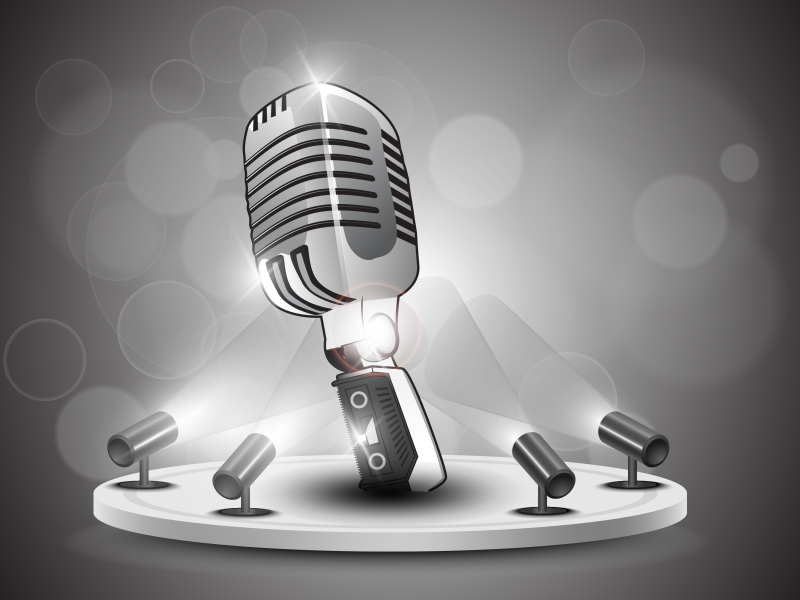
by Ben Zackheim | Mar 25, 2015 | Book Promotion, Digital Identity, Sell your book, Writing |
[Tweet “Spend an hour a week listening to one of these podcasts for writers. Go in with eyes wide open!”]
From Joanna Penn‘s excellent selection of business tips to The Self Publishing Podcast‘s eerily helpful smack talk, there’s something here for you to enjoy.

The Self-Publishing Podcast is one my my favorites, with Sean Platt (), David Wright () and Johnny B. Truant () lobbing inside jokes peppered with fantastic ideas. The charm of the hosts is a big part of the draw but their success can’t be ignored. My money is on these three authors hitting it BIG and it’s fun to watch their careers grow. What’s the benefit for us? We can draw parallels with their hard work, disappointments, victories and struggles. It’s like an epic serialized story with three guys sitting on their asses.
Best enjoyed with: A red chili lunch with espresso chaser.
Favorite episode: Selling on Apple, Kobo and Barnes & Noble

Joanna Penn () is a staple of the indy community. She’s been sharing her experiences as an author and entrepreneur for a few years, so her perspective has weight. She’s recently started to focus on the craft of writing as well. I like Joanna for her optimism and her focus on the future. Anyone who can make me feel good about this tough business has earned my attention!
Best enjoyed with: Tea (spiked with sherry)
Favorite episode: Optimizing Kindle Categories, Email List Building and Facebook Marketing with Nick Stephenson

The Reading and Writing Podcast is a great way to hear from your favorite authors about their latest books and the writing life. From Dean Koontz to Lee Childs to Walter Mosley, this podcast snags some of the best writers in the business. Straight-forward, insightful questions from the host Jeff Rutherford ( ) make the podcast a must-listen for those moments when you just need inspiration and guidance. At 181 episodes (and counting) this is the legacy podcast that should be on everyone’s subscription list.
Best enjoyed with: Buttermilk Cornbread Waffles (sweet and savory goes well with the interview AND the southern accent!)
Favorite episode: Walter Mosley. So talented. So classy.
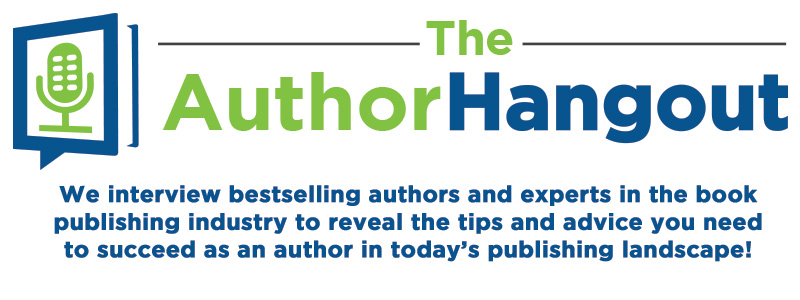
The Author Hangout () is a new entry in my must-listen list. They’re off to a good start with helpful interviews of authors and marketing folk. Their series on blog tours is the best I’ve ever seen. The podcast is part of the Book Marketing Tools site which sells author services (see my review of their promo tool). However, they do a good job of keeping their business out of their advice.
Best enjoyed with: Pad of paper and pencil for the deluge of tips.
Favorite episode: Author Earnings: The Real Story (only Hugh Howey could find a way to say, “Indy publishing is like a raisin muffin”!)

The Self-Publishing Roundtable is a storied podcast with high turnover. People come, people go, but it always remains informative. They cover everything from marketing tactics to creative tips. The conversations are intelligent, focused and current. For example, one of the newest episodes cover Mastermind Groups. Yes, Masterminds are packed with buzzy-sugarness but they are a useful way to get inspired fast.
Best enjoyed with any slow food. Good for the digestion!
Favorite episode: Making Money In The YA Market
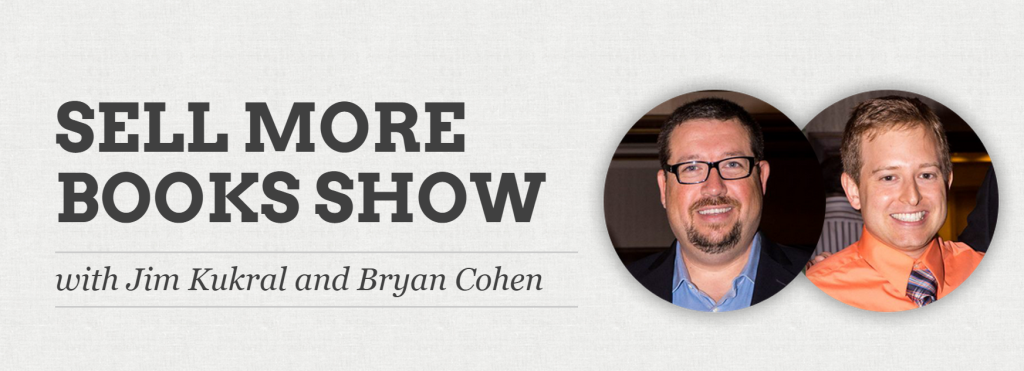
Jim Kukral () and Bryan Cohen () host this helpful, slick show. There’s the occasional plug of author services (Jim Kukral started Author Marketing Club) but they’re smart about it. Their Three Tips segment launches the discussion and they tend to be dead-on with their advice. Jim and Bryan also cover current news (which can lead to amusing discussion-rants).
Best enjoyed with: Whatever you eat while you’re watching the evening news.
Favorite episode: Digital Resale, Virtual Assistants and Shorter Books (they also cover Amazon Giveaways, though they come to the wrong conclusion ;-))

The Science Fiction & Fantasy Marketing Podcast covers, um, Science Fiction and Fantasy marketing. Lindsay Buroker () of The Emperor’s Edge fame joins Joseph Lallo (, The Book of Deacon) and Jeffrey M. Poole (Tales of Lentari) to discuss tactics and strategies for one of the most popular genres. The podcast is relatively new but the years of experience shine through. From showing up at shows with 3D printed swag to maximizing free promotional days, this one covers the tried-and-true and the cutting-edge.
Best enjoyed with: Mead. Ferengi crab.
Favorite episode: Book Bundles, Marketing Successes and Failures, and Creating Author Swag
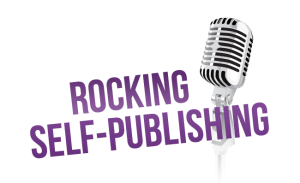
If soothing British accents are your thing, then you need to tune in to Rocking Self-Publishing to find a mantra. If you like soothing British accents that are saying something useful then browse the Rocking Self-Publishing library. Packed with wisdom, inspiration and common sense it’s a welcome break from the grind. Simon Whistler () is enthusiastic and hungry to extract useful information for himself and his listeners.
Best enjoyed with: Tea (spiked with tequila). Bacon.
Favorite episode: The Importance of Being an ‘Authorpreneur’ (author/entrepreneur) with Joanna Penn (two British accents bounce off of each other like wind chimes on the bayou)

This new podcast also enjoys the presence of Lindsay Buroker (she’s everywhere!) The show is low-key and informative, with co-host Adam Poe () touching on topics that we have questions about. Pay special attention to episode 7 where he goes over how to get your books on Google Play. He’s found some success there and recommends authors get their books up for sale ASAP. I also enjoy The Writing Podcast‘s wise choice to interview traditionally published authors. We all have something to contribute to this writing life.
Favorite episode: Getting your books on the Google Play store
So there you have it! My favorite podcasts for writers. Every one of these shows is consistent, informative, well-intentioned and worth checking out. If you end up becoming a fan, tell them I sent you! ;-)
What are your favorite podcasts for writers and authors? Answer in the comments below…

by Ben Zackheim | Jan 23, 2015 | Digital Identity, Writing |
My cousin is a musician. He’s worked his entire professional life amidst notes; touring with a successful band for years, producing several fantastic CDs and teaching. When iTunes slammed into the planet and made music digital and cheap he was angry.
“Too bad, cuz,” I’d say. “You know what they say. Adapt or die!”
Okay, I didn’t say it like that, but it’s the message that he probably took away from our debates.
Then Spotify and its ilk pushed music even further into the ether. Songs became not just a commodity, but a common element. Like air, except louder and with a riff.
Poor music business.
But what if indy authors have more in common with our musical peers than we think? What if the proliferation of subscription services is sending us down a path of permanently earning less for our books.
I’m an optimist. I believe that the writing life is a wonderful life. I know it’s here to stay. But it may need to change into something different.
So I got to thinking. Stand back. It’s a dangerous thing. Ask my wife. Or my cousin.
Here’s my take…
Musicians have concerts. Gigs can add some cash to the coffer as music sales drop through the stage. At gigs, bands sell CDs (and LPs!) to the audience.
But writers have nothing similar. Book readings are the closest thing, but they’re not as essential to the reader as live music is to the music fan.
So are we doomed to just maneuver the same turbulent sea of shifting tactics to survive Amazon’s whims, or Facebook’s changing policies, or a tiered Internet?
Believe it or not, I’m going somewhere positive with all of this.
What if writers need to produce their work to find that alternate revenue stream? Produce our work? What the hell does that mean, Ben? Well, what if I need to make The Camelot Kids a comic book and a weekly animated short for it to make me money? What if Shirley Link is a monthly podcast and a small indy film? Maybe your book is a future YouTube hit? What I’m searching for here is that secondary revenue stream that leverages the wonderful book we’ve written and builds upon it for a modern audience.
Does that makes sense? I mean, we tell stories. On paper. On touchscreens. But maybe we need to ponder other ways to tell our stories.
Maybe we need to tap into these social network thingies and find audio recording, film making, 3D animating peers who will work for a cut of the profits.
As importantly, maybe new services need to spring up that help us make our books into animated movies, or plays, or films, or games, or virtual reality experiences. Yes, there’s ACX. There are fun toys like Booktrack. Those are along the lines of what I’m talking about, but what I’m starting to see is that I need to break out of my comfort zone (even more than I already have). I’m starting to see that the same way that musicians had to learn to set up a gig, perform and connect with music fans in a whole new way, well maybe in some twisted, introverted wordish way that’s our future, too.
What do you think? Could you envision writers as media producers? Do you think a successful indy author will need to be a successful media producer in the near future? Is the thought too terrifying to ponder? Or does it excite you?

by Ben Zackheim | Sep 15, 2014 | Book Promotion, Digital Identity, Sell your book, Writing |
My goal with this post:
To give you clear tips on how to arrange your Twitter activity. The tips will be practical and will help you manage your personal and professional sharing. Let me know how I did in the comments!
I did it. I finally did it.
I’ve been on Twitter since 2007, which means, well, I’ve spent a lot of time worrying about tweeting since 2007. Oh, I have a lot to say. I have a lot to share. I always spot interesting conversations. The problem for me has never been finding things to disperse. The problem has been The Twitter Time Suck.
The Twitter Time Suck is:
- The black hole of starting to tweet interesting material and not being able to stop.
- The anxiety around whether my tweets are having maximum impact, which leads to more tweeting.
I’ve spent the last several years trying to find a way to make posting take less time but be more rewarding. What do I mean by rewarding?
- Just as every conversation I have with a person is part of the fabric of my life, I want my posts (on every platform) to reflect who I am (NO PRESSURE!)
- I enjoy connecting with someone.
- I like to get traffic to my site.
- I like to sell books.
If those four points sound familiar, and you also fret about The Twitter Time Suck, then I may have some good news. I’ve found a perfectly reasonable system to keep my tweeting to 15 minutes per day.
Last year I started to manage social media for The School of Visual Arts’ MFA Visual Narrative program in NYC. It’s a fantastic low-residency Masters degree with faculty like Benjamin Marra, Joe Kelly and Edward Hemingway. Because the focus of the degree is on visual storytelling you can imagine how daunting the task of sharing information via Twitter was to me. Remember, I still had to manage my own social media efforts. Having so much to dig through easily led to brain-hurt.
So I started to try a few things to help me juggle it all. I’ll spare you the trial and error.
This is where I landed
1) Use your morning activities:
We have coffee, we shower, we brush our teeth, we read the news. Morning routines (even busy ones) are where many of us quietly review our priorities and our dreams/wishes/aspirations for the day. There’s a lot to find in that mental landscape. Be mindful of your thoughts. Don’t just think them and let them go. If the warm water on your head makes you think of something funny, say it out loud. That will help make it real and memorable. If you want to share it with the world, well, then you have your daily observational tweet!
If you come up with more than one thought, jot it down in a txt file asap. You can tweet it later using…
2) Hootsuite. Use it.
Hootsuite allows you to queue up your tweets. This is the critical task in any effort to simplify tweeting. You can also use Hootsuite to post to Facebook and LinkedIn. Yes, I’ve used Buffer and Klout. Hootsuite is the best.
3) Set your tweet limit for the day.
My limit is six tweets. For some, that’s low. For some, that’s high. Find your limit and stick to it. But don’t worry about it if you go over or under your number. Worrying wastes time ;-) If you have an account that bridges both personal and professional, then break it down like this at first. Adjust as needed:
50% content tweets (cool articles, helpful posts, beautiful images, quotes)
25% professional tweets (book excerpts, deals, product images)
25% personal tweets (jokes, observations)
4) Tweet your best stuff again. And again.
Be sure to tweet your good stuff often. Don’t worry about it being seen by everyone every time. It won’t be. To stand out in the noise you need to put your best foot forward, and sometimes that best foot is wearing an old shoe. Yeah, my metaphors suck today, but I’m still right.
Tip: If you sign up for Twitter ads you can get incredible insights into what tweets get the most engagement.
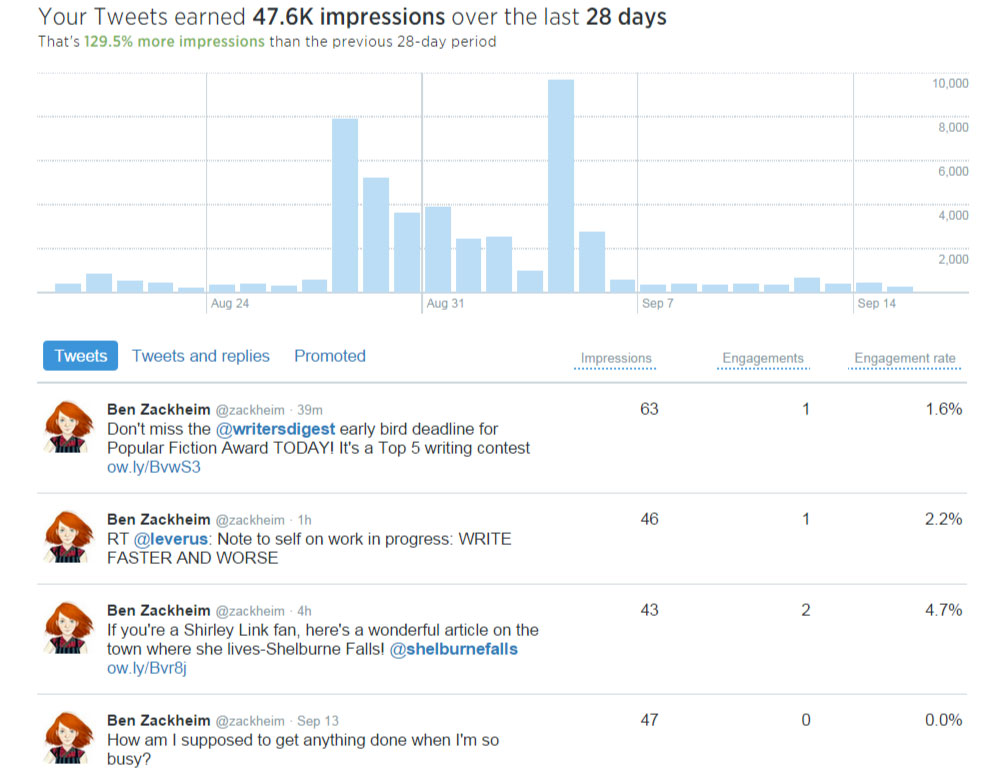
Track this data and retweet the posts that have legs to them. Logically, you wouldn’t lean on tweets that are based on breaking news too many times. But if you make a funny observation about life, really it’ll never get old!
Sticking to these rules for my Twitter-life has cleared up my head so I can pay attention to work and family and Angry Birds Star Wars.
What do you do to maximize your time-spent:impact ratio?

by Ben Zackheim | Jun 24, 2014 | Digital Identity, Writing |

When I talk about an artist’s Digital ID my focus is on the presentation and preservation of who we are and what we do in the digital realm. In my opinion, today’s creative people have a unique opportunity to define how we’ll be discovered, seen and remembered. The same way that victors write the history books, only the artists who make the right choices around their digital legacy will produce lasting work.
It’s a tough concept to get our heads around. Hell, I’m writing this series so that I can begin to understand it myself. But it’s an important discussion, because our conclusions will yield solid next steps for:
-
Being online in a way that’s true to ourselves and our work
-
Ensuring that our hard work will be enjoyed long after we’re gone
So perhaps this particular wrinkle in Google’s robe will shed light on what we’re talking about. Not because it’s some sexy new feature or product. But because of its spectacular presumptuousness.
Forget being remembered, how can you manage to be forgotten?
Europe’s highest court recently passed down a ruling that’s widely called The Right To Be Forgotten. In response, Google announced a new service that allows EU citizens to submit a form to be removed from Google’s European results. I don’t want to get into the details of the process, because the thing that fascinates me is the premise of submitting a form so you can get wiped from the memory of the largest catalog in human history — besides our DNA of course ;-)
Sure, some people may want to protect their privacy. Some want to erase sordid pasts. Some want to start over after identity theft. But what does it even mean to be forgotten in the 21st century? The EU law’s premise and Google’s compliance seem to imply that Google, through its search engine, email, etc. is in some real way trying to remember us. After all, the opposite of being forgotten is to be remembered.
But that’s a flawed premise.
Anyone who is indexed, tracked, covered, Tweeted, shared, Liked, Plussed or nonplussed is not going to be remembered. The data will disappear over time. The memory will dissipate in spectacularly unnatural ways. Server outages will erase books, bad code will decimate entire portfolios, db updates will wipe out metadata, a hack will corrupt billions of sole backups.
Google’s bankruptcy will strand it all, casting trillions of our creations into purgatory, like ghosts who just want to be remembered.
Fire, war, catastrophe, decay. The list of what will most definitely happen to our digital data goes on and on.
So, in the long run, (which is the only run I’m interested in here) the idea that Google is remembering us is like saying cramming for a test is learning. You retain a tiny percentage of what you study, but most, if not all, is lost to the wind.
Maybe the EU and Google and the media just threw a name at the ruling that sounded clever. The right to be forgotten certainly presses some buttons, doesn’t it? Maybe they don’t mean to jump into the murky pool of legacy, or history books or what defines a “permanent record.” But even if that’s the case, the very fact that language like this is used around the digital version of our lives implies that we truly believe that our servers and our electricity and our file formats are part of a strong record, or a collective memory.
They are not.
So “The Right to be Forgotten” throws into stark relief this premise of being online in a way that lasts. Creative people can find a way to get online that’s true to their work and to themselves. But let’s not forget that everything we do online is ethereal in the long-run. That’s not a bad thing. It just means we need to prepare.
In my next post on Digital ID, I want to start laying out a strategy for getting online like you want to get online! Enough philosophy, let’s get our hands dirty for a bit…
By Ben Zackheim
Read more about Digital ID:
What’s your Digital ID?
WordPress for authors and writers (part four)
WordPress for authors and writers (part three)
WordPress for authors and writers (part two)
WordPress for authors and writers (part one)

by Ben Zackheim | May 29, 2014 | Digital Identity, Writing |
NOTE: In the coming months I’m going to write about how we present ourselves online. Digital ID, as I call it, is the sum of:
After two decades of doing business online, I’ve realized that we must know who we are offline to establish the strongest Digital ID. I’ll set out to prove that thesis in my articles.
We’re all learning how to maneuver this wonderful, liberating mess together! So I look forward to hearing this community’s opinions.
—
I like the image above because it’s how I feel when I wake up in the morning and put on my marketing cap and get on Facebook. I feel like I’m immersed in a pool of people, some of us connected, some of us not, some of us wanting to be connected, some of us not. And I think it’s important to recognize that mess. I think understanding how messy things are makes it easier to understand how we feel about establishing a digital ID. And, just as importantly, what we need to do to set up our own Digital ID.
What do I mean by that?
Here’s my best explanation: I’m a strong believer in the independent storyteller’s power. Not just the power of moving people to think and act and feel, but the power to find an audience on your own that you can tell your story to.
The Slow, Agonizing, Delightful Death of the Gatekeeper
For a long time, storytellers have been ruled by gatekeepers who got to tell us, “That story is good enough and worth this much. But that one sucks and good luck!”
Those days are coming to an end.
And how do I know this?
Because I was a gatekeeper.
I told some brilliant people that their stuff wouldn’t make it in today’s market. Sometimes I was right, sometimes wrong. But the powerful emotions I felt when I saw some of them move on and do great things were undeniable.
I wasn’t regretful.
I wasn’t envious.
I was inspired.
I saw them leveraging brand new tools, online services, ways of connecting that no one had thought of. They found their audience without Viacom, ESPN, AOL, Sony and all those other places where I worked.
Those gatekeepers were wrong.
I was wrong.
For my part, I had enough confidence in my own writing talent to strike out and try this new world on for size myself.
Now, the jury is still out on whether that was a good idea. While I’m doing great, I’m not making a living wage at writing my books. But I like the trajectory and I love the process. The freedom is exhilarating.
And it’s messy. Like this post’s image.
So what does this mean for working artists?
We’re living through a fundamental shift in how people learn about us and how we learn about them. As a writer looking for an audience I know in my heart that I’ll find my readers only if I stay true to myself.
To be clear, I find the incredibly detailed tracking of people by big companies creepy. I don’t trust them with the information. The counterpoint is that most of them are sharing that data with everyone. Some charge (like FB) and some don’t (like Google). Does that make it okay? I don’t know the answer to that.
I do know that I can go online and have a universe of data on my target audience at my fingertips. If I work hard, stay true to myself and my work, I can reach them and I can make a living telling my stories. The sacrifice I make is that my interests, preferences, friends and behavior is also thrown into this messy pool of data — slicing my identity into little pieces for another artist or writer or entrepreneur to scour through and evaluate.
[Tweet "I'm a data point for someone else. And they're mine."]
It’s a fascinating, liberating, terrifying time. And I’m delighted to be a part of the mess every single day.

by Ben Zackheim | Apr 22, 2014 | Book Promotion, Digital Identity, Sell your book, Writing |
Isn’t it fun to write about yourself? Wouldn’t you love to make a career out of coming up with new ways to talk about how interesting you are? Me neither.
Can author bios sell books? If you believe that a great cover, glowing reviews and a spot-on book description can sell books, then you’ll believe me when I say yes. The author bio is a featured data point all over the web. If a reader loves your bio, then imagine what they can get out of an entire book! Yeah, author bios sell books.
The fact is, author bios are the best way to make yourself compelling to a complete stranger who’s thinking about buying your book. Very few authors over the years have enjoyed crafting bios. But we still need them.
And we need to write more of them! For example, you need to tailor unique bios for your marketing efforts. Blogs, newsletters, deal sites, listings… many of them want a unique bio and book description when you submit. It’s frustrating but it makes sense. They don’t want their audience (or Google) to see them as redundant.
So here are some best practices that I’ve discovered on my journey. They’ve saved me time. They’ve made promotion just a tad bit easier just when I needed it most. And they’ve sold a few books!
Author bio tip 1. Your bio isn’t about you. It’s about your audience. Okay, technically that’s not true, but think about it. You’ve caught someone’s attention! That’s a big win! Don’t lose it by taking your eyes off of your goal here.
So make the bio appeal to your target audience. If that means showing off your snappy, friendly and entertaining self to sell your kids book, then cool. If you’re going for insightful, deep and intelligent for your paranormal romance then let it fly.
But please, whatever you do, don’t neglect your bio. It’s not below you. Some readers consider it a key part of their decision to buy, so treat your bio with the respect it deserves.
While all five of these tips will help you make a better bio, tips 2 and 3 are the best advice for how to write an author bio that sells books.
Author bio tip 2. Write the bio for the site where it will live, and mention your reading interests. As I’ve advised before, you should dig into the online store that you’re selling on. Even a smattering of research can yield insights that will help focus your bio.
What kind of books do you enjoy? Mystery? On Amazon you get the following drop-down results when you type that term in the search window:

On B&N:
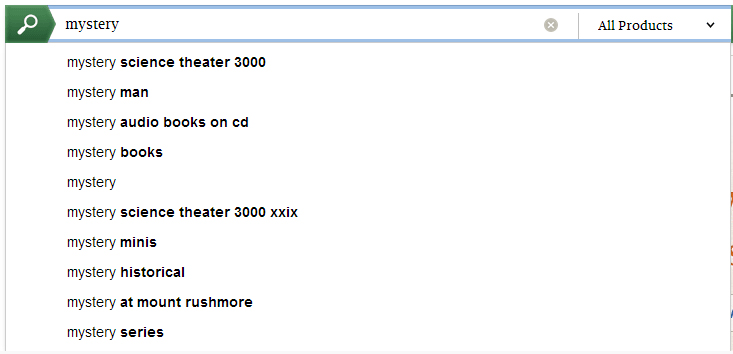
My advice for this genre is to mention you like “mystery series” on your B&N bio. Mention you enjoy “mystery books” or “mystery and thriller” on your Amazon bio.
See what I’m doing there? I’m leveraging the site’s search engine to tell me what customers search for. All the terms that you see in the drop-down are arranged by popularity, so it’s great info that you can use to connect with readers.
I’ve written on this method of finding your target audience before, so I won’t belabor the point.
But one last thing, don’t get bogged down on this step. Really, what you should do is…
Author bio tip 3. Be passionate. When you write about your passions, your writing gets better. So mention your passions — hobbies, family, travel stories. It will help you connect with the reader.
Author bio tip 4. When you do finally get in the mood to hammer your way through your author bio, don’t just write one! Hey, you’re on a roll, so take advantage. Write five to ten quick and dirty bios that you can adjust later. Keep it in one file, somewhere safe. Then when you run into one of those sites that requires you to give them a unique author bio, you’ll have some fresh ones to choose from. Tighten it up and you’re done.
Author bio tip 5. First or third person? Great question. More independent authors are choosing first person. I think the reason for this is two-fold. One, it’s more comfy. Two, they want to convey their brand in a more casual way.
The counter argument is “first-person is amateurish and third person is professional.” The bios you read on books in the bookstore are rarely in first person, after all.
But I think most bios sound dull. And I’ll bet they’re dull because they’re written by authors who aren’t comfortable writing about themselves in the third person. Or they’re written by a hired hand who doesn’t know the author. Either way I lean toward first person myself because that’s what comes naturally.
How about you? Go ahead and paste your author bio in the comments section. We’d love to hear your thoughts on how to write an author bio that sells books!
By Ben Zackheim


















